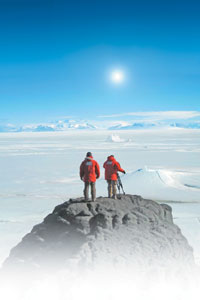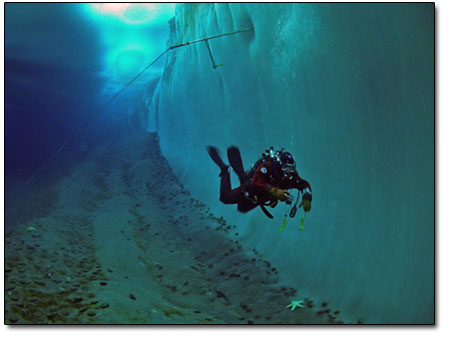|
| ||||
| Encountering Antarctica
by Judith Reynolds When Werner Herzog applied to the National Science Foundation for permission to film in Antarctica, his proposal didn’t read like any other. He had no intention of quantifying anything. He didn’t plan on measuring or calculating. There would be no tables, graphs or scientific explanations of what goes on at McMurdo Station, where 1,100 men and women study everything from glaciers to penguins. Nor would he tell a story about “pristine landscapes and fluffy penguins,” as he says at one point in his dry voice-over narration. Herzog, for those who know his films – “Grizzly Man,” “The Wild Blue Yonder,” “The White Diamond” – was intent on a deeper truth: what it is like to be at the bottom of the earth, the edge of the planet. Who are the people who go there to work in extreme conditions in what many call deprivation jobs? Is it about money? Science? Adventure? Or is it ultimately about a vision of life and a dream of the world? Don’t be fooled by Herzog’s disarmingly simple narration. With his benign manner and German-accented English, he tells you what happens and why he chose this subject. He wonders out loud about who he might meet and what he might learn. The film opens in darkness with the hypnotic chant of a Russian Orthodox choir. Then suddenly, spectacular underwater photography takes you below the ice in the great Ross Sea. It was this kind of photography that compelled Herzog to make the documentary. Again, don’t be fooled into thinking this will be a lush visual journey. With a swift Herzogian kick where reality bites, he contrasts serene beauty with life in McMurdo Station with its mining-town mud and prison-like architecture. On landing at this permanent construction zone, we meet the first of Herzog’s eccentrics and learn why on earth they are there. Scott Rowland picks up Herzog and drives him into town in his massive vehicle, Ivan the Terra Bus. Rowland left behind a boring Colorado banker’s life to join the Peace Corps, narrowly missed being killed in Guatemala, and next chose Antarctica.
Soon we meet another heavy-equipment operator. Stefan Pashov operates a bulldozer and saunters toward the camera with a smile and an enchanting tale. As a child, Pashov says, he was inspired by his grandmother’s reading of The Odyssey. Before he could read, he dreamed of being an Argonaut and traveling to exotic places. In muddy McMurdo, Pashov knows he’s among other adventurers: “Most of the people here are full-time travelers, part-time workers … and profound dreamers.” The film is episodic, alternating beautiful nature shots with brief interviews, idiosyncratic moments with a variety of scientific experiments and the sorcerers who conduct them. There’s nothing conventional about the choices or the ways in which people describe what they do. As a counterweight to the recent American love affair with penguins, Disney’s “Little Feet” and “March of the Penguins,” Herzog interviews marine biologist Dr. David Ainley on Cape Royds about unusual behaviors – occasional three-way mating and the rare but real confusion that leads some penguins to march to the mountains not to the sea. The sight of a disoriented penguin bravely waddling in the wrong direction may be the most poignant moment in the film. Above all, Herzog is filled with wonder. He communicates that part of his experience through breathtaking photography, where divers look more like astronauts than undersea men on a scientific mission. The musical underpinnings range from the deep throbbing of the Russian choir to Irish ballads, the whistling sounds of seals and cracking of ice. One group of scientists are shown prone on the ice listening to the continent breathe. Of Herzog’s 40 films, “Encounters” is another splendid example of his unusual approach to documentaries. He injects himself into his work and communicates a sense of wonder and amazement. His vision of nature is dark and Darwinian, witness “Grizzly Man.” But he’s also stunned at human survival, witness “Little Dieter Needs to Fly.” That 1997 documentary about a German pilot who crashed in the jungle and escaped horrendous circumstances turned into Herzog’s 2006 action drama starring Christian Bale: “Rescue Dawn.” Life is about survival on this mysterious and beautiful planet. If you want to see yet another exposition of this philosophy by a master filmmaker, don’t miss “Encounters at the End of the World.” •
|
In this week's issue...
- May 15, 2025
- End of the trail
Despite tariff pause, Colorado bike company can’t hang on through supply chain chaos
- May 8, 2025
- Shared pain
Dismal trend highlights need to cut usage in Upper Basin, too
- April 24, 2025
- A tale of two bills
Nuclear gets all the hype, but optimizing infrastructure will have bigger impact



